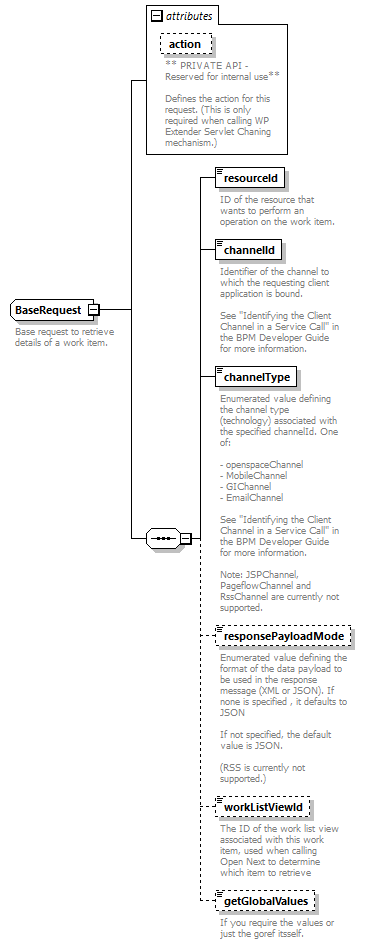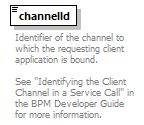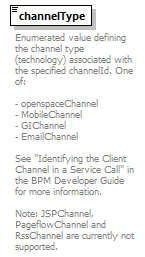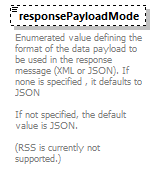| diagram |  |
||||||||||||||
| namespace | http://base.api.wp.n2.tibco.com | ||||||||||||||
| children | resourceId channelId channelType responsePayloadMode workListViewId getGlobalValues | ||||||||||||||
| attributes |
|
||||||||||||||
| annotation |
|
||||||||||||||
| source | <xsd:complexType name="BaseRequest"> <xsd:annotation> <xsd:documentation>Base request to retrieve details of a work item.</xsd:documentation> </xsd:annotation> <xsd:sequence> <xsd:element name="resourceId" type="xs:string"> <xsd:annotation> <xsd:documentation>ID of the resource that wants to perform an operation on the work item.</xsd:documentation> </xsd:annotation> </xsd:element> <xsd:element name="channelId" type="xs:string"> <xsd:annotation> <xsd:documentation>Identifier of the channel to which the requesting client application is bound. See "Identifying the Client Channel in a Service Call" in the BPM Developer Guide for more information.</xsd:documentation> </xsd:annotation> </xsd:element> <xsd:element name="channelType" type="ct:ChannelType"> <xsd:annotation> <xsd:documentation>Enumerated value defining the channel type (technology) associated with the specified channelId. One of: - openspaceChannel - MobileChannel - GIChannel - EmailChannel See "Identifying the Client Channel in a Service Call" in the BPM Developer Guide for more information. Note: JSPChannel, PageflowChannel and RssChannel are currently not supported.</xsd:documentation> </xsd:annotation> </xsd:element> <xsd:element name="responsePayloadMode" type="df:payloadModeType" default="JSON" minOccurs="0"> <xsd:annotation> <xsd:documentation>Enumerated value defining the format of the data payload to be used in the response message (XML or JSON). If none is specified , it defaults to JSON If not specified, the default value is JSON. (RSS is currently not supported.)</xsd:documentation> </xsd:annotation> </xsd:element> <xsd:element name="workListViewId" type="xs:long" minOccurs="0" maxOccurs="1"> <xsd:annotation> <xsd:documentation>The ID of the work list view associated with this work item, used when calling Open Next to determine which item to retrieve</xsd:documentation> </xsd:annotation> </xsd:element> <xsd:element name="getGlobalValues" type="xs:boolean" minOccurs="0"> <xsd:annotation> <xsd:documentation>If you require the values or just the goref itsself.</xsd:documentation> </xsd:annotation> </xsd:element> </xsd:sequence> <xsd:attribute name="action" type="ActionType"> <xsd:annotation> <xsd:documentation>** PRIVATE API - Reserved for internal use** Defines the action for this request. (This is only required when calling WP Extender Servlet Chaning mechanism.)</xsd:documentation> </xsd:annotation> </xsd:attribute> </xsd:complexType> |
attribute BaseRequest/@action
| type | ActionType | |||||||||||||||||||||
| facets |
|
|||||||||||||||||||||
| annotation |
|
|||||||||||||||||||||
| source | <xsd:attribute name="action" type="ActionType"> <xsd:annotation> <xsd:documentation>** PRIVATE API - Reserved for internal use** Defines the action for this request. (This is only required when calling WP Extender Servlet Chaning mechanism.)</xsd:documentation> </xsd:annotation> </xsd:attribute> |
element BaseRequest/resourceId
| diagram |  |
||
| type | xs:string | ||
| properties |
|
||
| annotation |
|
||
| source | <xsd:element name="resourceId" type="xs:string"> <xsd:annotation> <xsd:documentation>ID of the resource that wants to perform an operation on the work item.</xsd:documentation> </xsd:annotation> </xsd:element> |
element BaseRequest/channelId
| diagram |  |
||
| type | xs:string | ||
| properties |
|
||
| annotation |
|
||
| source | <xsd:element name="channelId" type="xs:string"> <xsd:annotation> <xsd:documentation>Identifier of the channel to which the requesting client application is bound. See "Identifying the Client Channel in a Service Call" in the BPM Developer Guide for more information.</xsd:documentation> </xsd:annotation> </xsd:element> |
element BaseRequest/channelType
| diagram |  |
||||||||||||||||||||||||
| type | ChannelType | ||||||||||||||||||||||||
| properties |
|
||||||||||||||||||||||||
| facets |
|
||||||||||||||||||||||||
| annotation |
|
||||||||||||||||||||||||
| source | <xsd:element name="channelType" type="ct:ChannelType"> <xsd:annotation> <xsd:documentation>Enumerated value defining the channel type (technology) associated with the specified channelId. One of: - openspaceChannel - MobileChannel - GIChannel - EmailChannel See "Identifying the Client Channel in a Service Call" in the BPM Developer Guide for more information. Note: JSPChannel, PageflowChannel and RssChannel are currently not supported.</xsd:documentation> </xsd:annotation> </xsd:element> |
element BaseRequest/responsePayloadMode
| diagram |  |
||||||||||||
| type | payloadModeType | ||||||||||||
| properties |
|
||||||||||||
| facets |
|
||||||||||||
| annotation |
|
||||||||||||
| source | <xsd:element name="responsePayloadMode" type="df:payloadModeType" default="JSON" minOccurs="0"> <xsd:annotation> <xsd:documentation>Enumerated value defining the format of the data payload to be used in the response message (XML or JSON). If none is specified , it defaults to JSON If not specified, the default value is JSON. (RSS is currently not supported.)</xsd:documentation> </xsd:annotation> </xsd:element> |
element BaseRequest/workListViewId
| diagram |  |
||||||
| type | xs:long | ||||||
| properties |
|
||||||
| annotation |
|
||||||
| source | <xsd:element name="workListViewId" type="xs:long" minOccurs="0" maxOccurs="1"> <xsd:annotation> <xsd:documentation>The ID of the work list view associated with this work item, used when calling Open Next to determine which item to retrieve</xsd:documentation> </xsd:annotation> </xsd:element> |
element BaseRequest/getGlobalValues
| diagram |  |
||||||
| type | xs:boolean | ||||||
| properties |
|
||||||
| annotation |
|
||||||
| source | <xsd:element name="getGlobalValues" type="xs:boolean" minOccurs="0"> <xsd:annotation> <xsd:documentation>If you require the values or just the goref itsself.</xsd:documentation> </xsd:annotation> </xsd:element> |
WSDL documentation generated by XMLSpy WSDL Editor http://www.altova.com/xmlspy